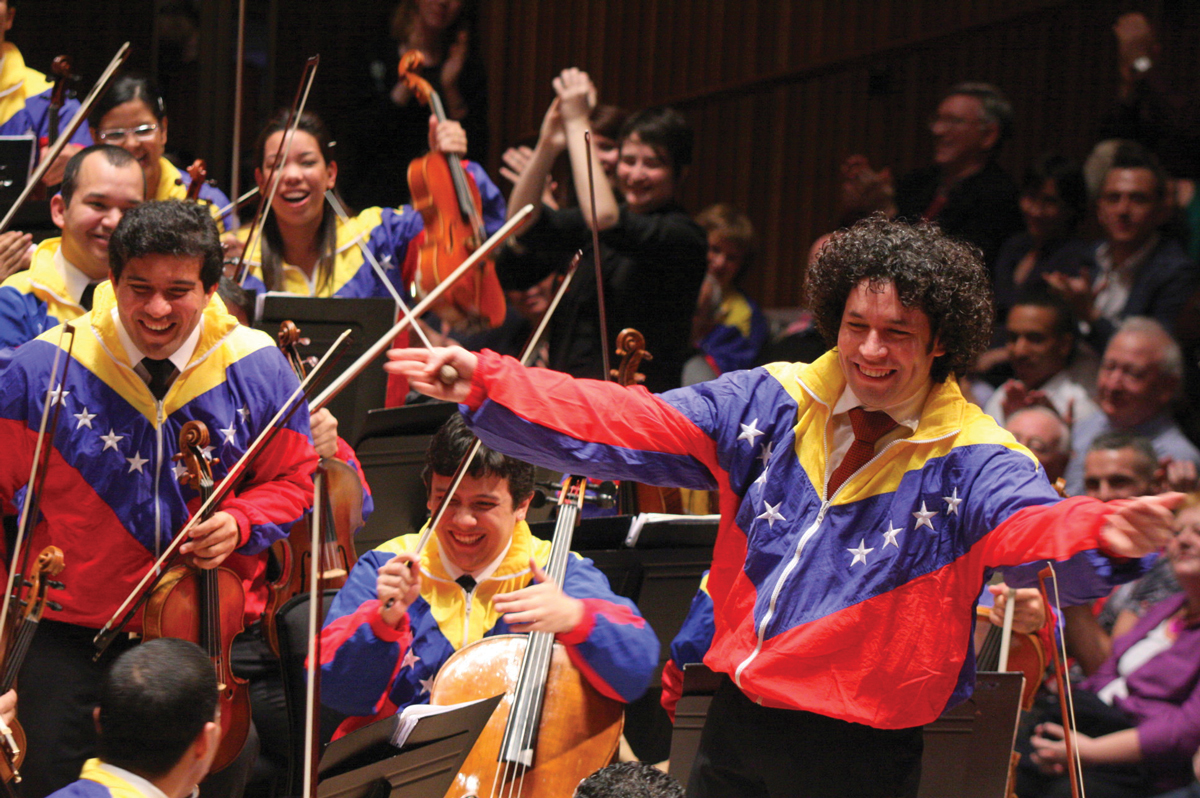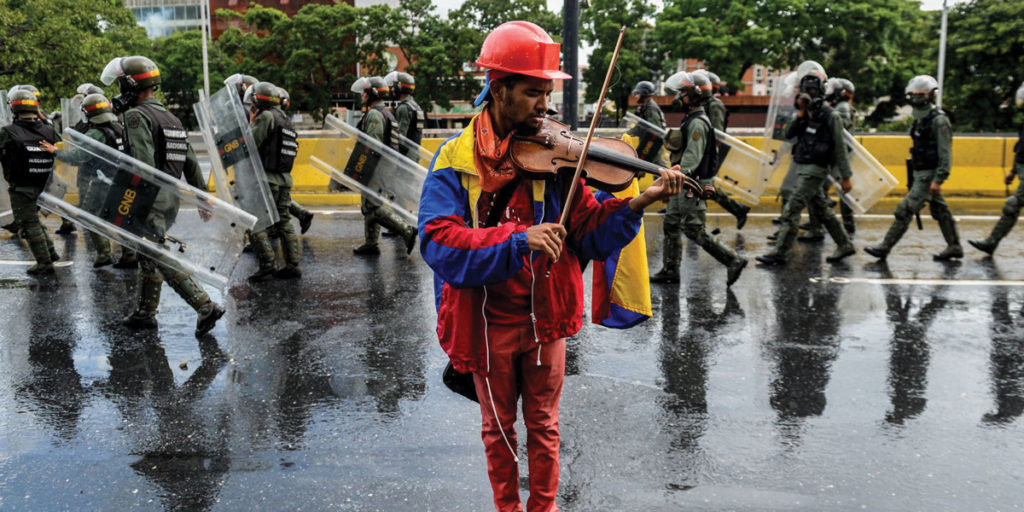The Semiconductor
by Deirdre Loughridge

Gustavo Dudamel conducting the Simón Bolívar Symphony Orchestra. Courtesy El Sistema, Caracas.
On a September evening in 2015, Venezuela’s Simón Bolívar Symphony Orchestra sat at the ready in an amphitheater in Berkeley, California. Their conductor Gustavo Dudamel walked to the podium, raised his baton, and set in motion the opening strains of Beethoven’s Ninth Symphony. Before long, the members of three local choirs would join the orchestra for the rousing choral finale: “Be embraced, millions! This kiss to the entire world!” I was one of 8,000 in the audience that evening, witness to a magical performance of one of the classical canon’s most epic works by the youthful, charismatic superstar conductor — who leads both the Bolívars and the Los Angeles Philharmonic, arguably America’s greatest orchestra. (He’s also the inspiration for Gael García Bernal’s character on the TV show Mozart in the Jungle.) As the concert’s organizers pointed out, Beethoven’s Ninth was “a call for universal brotherhood, and who better to deliver this message than Dudamel.”
Dudamel is a proud son of Venezuela and of El Sistema, the country’s renowned, widely imitated music education system, which puts orchestral instruments in the hands of hundreds of thousands of mostly poor youth, who rehearse for hours a day after school. But back home, doubts had hovered over Dudamel and his authority to deliver messages for humanity for over a year before that Beethoven thunderclap. In early 2014 — less than a year after Nicolás Maduro succeeded to the presidency after the death of Hugo Chávez — a toxic brew of economic dysfunction, rampant crime, and government corruption reached a boiling point, and tens of thousands took to the streets to protest Maduro’s government. This past February, in hunger-gripped Caracas, peaceful demonstrations ended in violence when security forces opened fire on protesters, killing three. Venezuelan pianist Gabriela Montero described the event in a widely circulated open letter as having “crossed a line,” and called on Dudamel to use his international fame to oppose Maduro and stop Venezuela’s democratic decay. Dudamel instead put out a mild statement, regretting the violence and invoking music as a “universal language of peace.” Back in California, he explained to the Los Angeles Times that he rejects calls to speak out on political issues. To do so, he said, would not be in the spirit of El Sistema, the music program that molded him and for which he is now a de facto ambassador.
This grim year for Venezuela, however, has tested Dudamel’s reticence as never before. First came the death, on May 3, of an 18-year-old violist, shot and killed by the national guard during a protest in Caracas. Dudamel posted a public statement on Facebook saying “enough is enough,” making a vague plea to Maduro to “listen to the voice of the Venezuelan people,” and issuing a more specific call for a halt to violence. Then, in July, Maduro called for the establishment of a new national constituent assembly to rewrite the constitution, which could bypass the democratically elected, opposition-controlled parliament and permit his further consolidation of power. Dudamel subsequently wrote an op-ed for the New York Times in which he decried the plan as unconstitutional, and called instead for negotiations between disparate parties.

No doubt Dudamel has hesitated in speaking out partly to protect El Sistema, whose $120 million budget is not coordinated by Venezuela’s culture ministry but rather under direct presidential control. But as I’ve listened to his pallid statements while Caracas burns, I’ve wondered whether his hesitation might not also be explained by the ideology Dudamel absorbed from his training in classical music. He seems to see music as an artistic sphere unto itself, capable of feeding the soul and having nothing to do with politics; hence the platitudes, such as Dudamel’s frequent line that music is a “universal language.” But this is an idea born in 17th-century Europe, out of sheer ignorance of how different music across the world could be. (At the time, either foreign music could be transcribed into western notation or it wasn’t really music.) Implying that music can unite us all just affirms the universality of western tonality; that kind of thinking hampers what communication across difference actually takes.
Dudamel also likes to use the orchestra as a model for society: both, he wrote in the Times, are “formed by a large number of people, all of them different and unique, each with his or her own ideas, personal convictions, and visions of the world.” Analogies between the orchestra and society also date back to the 17th century, but Dudamel glosses over one point: unlike in a liberal society, in an orchestra democracy plays no part. Orchestras, on the contrary, tend to be dictatorial; the conductor is absolute, and the concertmaster rules beneath him, followed by the principals of each section. The 18th-century Italian composer Francesco Galeazzi, in one of many pedagogical texts that would make an authoritarian smile, spells it out: “All the violinists of an orchestra must have complete, blind, and perfect subordination to the first violin, whoever he may be. Even in the case where he makes a mistake, they should all unite in following him, since he alone is responsible for the performance of the orchestra.”
Over the summer one figure has stood out within the protests in Caracas: the violinist Wuilly Moisés Arteaga, who has been playing the Venezuelan national anthem and other themes on the frontlines. His intent, he has said, is “to motivate the people who were demonstrating.” He has played through tear gas attacks, and had his instrument broken. Against the bromides about music bringing people together, here was a concrete form of “social action through music” (an El Sistema mantra that had been reduced to the idea of uplifting the poor through music), and one that was met with a firm response. On July 27, Arteaga was brutalized and arrested, charged with “inciting violence in public and possession of inflammatory substances.” Dudamel has remained silent on Arteaga, perhaps because he taught himself violin from YouTube videos rather than coming up through El Sistema. But it should be clear that a government willing to treat a violin as an instrument of violence is not one with whom one can negotiate in good faith.
Thinking back to that 2015 concert in Berkeley, I remember what a convincing performance it was of musical goodwill. But I also remember what did not take place: Dudamel had been meant to participate in several public events the following day, but would have to reschedule them, as he and his Bolívars had been called to perform at the United Nations. This is what we were told: the UN needed Dudamel, and so the unfortunate scheduling conflict only burnished his image as a messenger for universal brotherhood. In fact, however, it was Venezuela’s foreign minister, Delcy Rodríguez, who called Dudamel and his orchestra to play in New York. Rodríguez remarked at the event that El Sistema “represents the truth of Venezuela,” and congratulated Dudamel as “the maestro who entered the system as a child.” On August 4 Rodríguez was elected president of Maduro’s new assembly, which is now drafting a new constitution fit for an autocracy. So El Sistema seems to be safe for now, as along as they keep playing along.